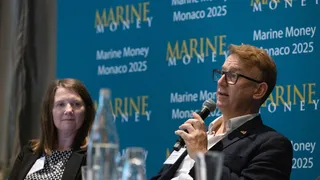Marine Money’s Superyacht Finance Forum marked its 18th edition on 23 September 2025, spotlighting the key economic and geopolitical forces shaping the yacht market.
Held at Le Méridien Beach Plaza in Monaco on the eve of the Monaco Yacht Show, the one-day conference gathered leading experts across the superyacht ecosystem to exchange critical market intelligence on what has been an eventful year. BOAT International acted as the event's media partner.
Kicking off the day was Heather Parkman, director of BOATPro, who conducted a deep dive into BOAT's current Global Order Book, looking at the charter market, industry trends and market outlook - all with figures collected from BOAT 's market intelligence tool, BOATPro.
Louis E. Sola - former Chairman of the U.S. Federal Maritime Commission, licensed yacht broker and founder of Evermarine - then shared his perspective on one of the biggest stories of the year: how U.S. trade policy is shaping the superyacht industry. In his session, U.S. Trade Policy and its Impact on the Superyacht Industry, he highlighted both the significant challenges the sector faces and the opportunities that lie ahead.
Tariffs remain a major concern, he said, noting that a 15 per cent levy on a $20 million yacht adds $3–5 million in costs which impacts brokers, financial institutions and thousands of workers. Current U.S. tax policy, known as the “One Big Beautiful Bill”, offers relief by allowing full first-year depreciation of yachts classified as business assets, even when financed, but its renewal depends on political decisions in Washington. Currency fluctuations add further pressure, as the weak dollar against the euro raises yacht prices by 10–12 per cent.
Sola stressed that the industry must speak with one voice to push for tariff exemptions, extend favourable tax policies and find ways to adapt to exchange rate shifts. Despite these obstacles, he concluded, the sector has shown resilience through wars, recessions and pandemics.
In the session Today’s Superyacht Finance Market, capital providers Toby Robilliard (Investec Bank plc), Steven Hawkins (JP Morgan Private Bank), Willem Steenkamer (St Julian’s Maritime Finance Ltd.), Zack Hamric (Azul Marine Lending LLC) and Olivier Blanchet (BNP Paribas) explored the sector’s challenges and opportunities. They highlighted a market where interest rates are falling but risk premiums are rising due to economic conditions. They also pointed to the trend towards an increasing number of family offices entering lending and more astute borrowers seeking capital arbitrage solutions. “We're seeing more sophisticated borrowers. I think as we move forward, we'll see more sophisticated borrowers, and they want sophisticated solutions,” noted Robilliard.
In a one-to-one discussion with Bob Allen, founding partner at Robert Allen Law, Marco Valle, CEO of Azimut Benetti Group, expanded on current challenges in the market. Coming off a ‘very successful Cannes Yachting Festival’, Valle emphasised that instead of a perceived industrywide slowdown, it was yachts under 80 feet (24 metres) that represent a more price-sensitive segment compared to larger vessels.
He stressed the industry's resilience post-COVID, noting that over the past few years there was a surge in yacht orders, but with some clients booking slots and then backing out. This has led to some challenges, such as yachts being reserved and resold. Despite this, he stressed that the actual number of clients remains high and overall demand is strong. The key focus now is to maintain professionalism in the industry and avoid creating the perception that the market is unstable.
The challenge for the industry, Valle said, lies in future-proofing. Clients often buy what they think they want now, but designers must anticipate what they will desire in the next four to five years and create concepts that meet future expectations.
Valle also noted that currency volatility and customs duties has compounded pressures, raising prices for U.S. buyers. He also highlighted shifting client demographics, pointing to strong demand from the Middle East.
Emphasising the need to adapt, Valle underlined the importance of investing in people and technology to meet the expectations of younger generations, who seek not only yachts but complete ownership experiences. “The new generation will have a different kind of approach, different kinds of needs. It's very true that we are facing this, and we need to evolve,” he concluded.
Read More/News anchors: Everything you might have missed at the Monaco Yacht Show 2025
